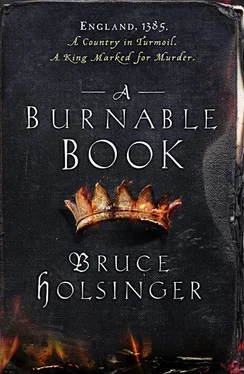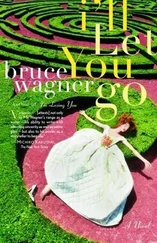Bruce Holsinger - A Burnable Book
Здесь есть возможность читать онлайн «Bruce Holsinger - A Burnable Book» — ознакомительный отрывок электронной книги совершенно бесплатно, а после прочтения отрывка купить полную версию. В некоторых случаях можно слушать аудио, скачать через торрент в формате fb2 и присутствует краткое содержание. Год выпуска: 2013, Издательство: HarperCollins Publishers, Жанр: Исторический детектив, на английском языке. Описание произведения, (предисловие) а так же отзывы посетителей доступны на портале библиотеки ЛибКат.
- Название:A Burnable Book
- Автор:
- Издательство:HarperCollins Publishers
- Жанр:
- Год:2013
- ISBN:нет данных
- Рейтинг книги:4 / 5. Голосов: 1
-
Избранное:Добавить в избранное
- Отзывы:
-
Ваша оценка:
- 80
- 1
- 2
- 3
- 4
- 5
A Burnable Book: краткое содержание, описание и аннотация
Предлагаем к чтению аннотацию, описание, краткое содержание или предисловие (зависит от того, что написал сам автор книги «A Burnable Book»). Если вы не нашли необходимую информацию о книге — напишите в комментариях, мы постараемся отыскать её.
A Burnable Book — читать онлайн ознакомительный отрывок
Ниже представлен текст книги, разбитый по страницам. Система сохранения места последней прочитанной страницы, позволяет с удобством читать онлайн бесплатно книгу «A Burnable Book», без необходимости каждый раз заново искать на чём Вы остановились. Поставьте закладку, и сможете в любой момент перейти на страницу, на которой закончили чтение.
Интервал:
Закладка:
The chancellor would be in his chambers off the hall. He avoided processions like the pestilence. My work, he would always say, is best done out of view, a sentiment I shared.
Two doors, then the lesser hall and the chancellor’s rooms. My face must have registered my fear, for when he saw it, Sir Michael de la Pole, usually cool, stood at once. With him was Edward More, his secretary and fixer, a man I had dealt with many times. Broad-chested, commanding, with a head and beard of shining white, More had a reputation for ruthless partisanship and calm under pressure. ‘What?’ the chancellor demanded.
‘It’s Hawkwood,’ I said breathlessly, my words barely a wheeze. ‘He has a man, in the papal delegation.’
‘How do you know this, Gower?’
‘There’s no time to explain, my lord.’ A deep breath, holding my side. ‘But believe me, my information is good.’
‘Who is he, Gower?’ More asked.
‘We’ll know him when we see him, I suspect. A trained assassin. Hawkwood wouldn’t take any chances with a middling knife. One of the cardinal’s guards, would be my guess.’
The chancellor went to a position by the outer door of his chambers, ducking his head to look out to the palace yard. ‘We can’t stop the procession. They just left the palace. We’re too late.’
‘Then we catch them,’ said More, belting on his short sword. ‘Even if it takes us to the abbey altar, we catch them.’
‘Very well,’ said the chancellor, arming himself as well. I followed them out of his chambers and across the hall, which was nearly empty as the procession got going from the palace. De la Pole summoned a clutch of pursuivants idling on the west porch, and we all sped together from the hall toward the royal procession, now making its slow way through the palace yard to meet the crowd still pouring in through the abbey gates, overwhelming the guards at the gatehouse.
As I saw immediately, the king and cardinal were on foot rather than mounted, as they would have been on the longer processions from the Tower, and it was nearly impossible to see them over the masses between their position and ours. The crowd was at least twenty ranks thick, all elbows and indignation as everyone fought for position. With the chancellor, Edward More, and the pursuivants we were ten men strong, though against so many moving hundreds we could hardly hope to force our way through. The noise was deafening, too, and our shouts could not be heard over the din. The pursuivants headed straight into the crowd, angling toward the king’s position. I bobbed along behind the outermost rank of spectators, taking short leaps into the air, feeling useless, attempting to get a glimpse of the principals and those clustered around them.
I stopped for a moment and took in the scene from afar, imagining myself atop the Wardrobe Tower at the far corner of the yard, or the bell tower opposite, and picturing the next few minutes in my mind. I reasoned that the attack, when it came, would happen before the abbey’s west entrance, where the procession would bottleneck to move through the great doors. If I could get well ahead of the principals I would have a better angle on any potential attacker, though it wasn’t clear to me what I could do about it. I pushed my way toward the abbey and gave two boys a shilling apiece to give up their spot on a column base.
I was now elevated two feet above the yard, but that was enough. Pockets of commotion everywhere, hard to tell what represented danger and what did not. I saw More. He was leading the chancellor and the small wedge of pursuivants toward the rearmost line of the procession. His focus was on the cardinal’s guards, a rank of ten Italian soldiers, dressed for the occasion in livery and flounce, with banners and flags held above as they marched. The guard had accompanied the prelate all the way from Rome. Despite the procession’s gaudiness these were seasoned, well-armed men. Any one of them would be capable of assassinating the king without a thought.
Yet even the closest of them was nearly forty feet from Richard. It would take a great effort to clear the distance, especially with the royal rearguard positioned where they were. For the first time since leaving Bromley I felt a twinge of doubt.
My gaze moved forward, along the intermediate ranks between the cardinal’s guard and the principals. Most of them were clergy, separated by order and office. In the rear walked monks of the abbey, a dozen of them in two close ranks. Next came the friars, six Franciscans and a lone Dominican, the seven of them forming a single rank. Before the friars marched five bishops: Wykeham, Braybrooke, William Courtenay the Archbishop of Canterbury, and two Italians, all of them grand with their caps and mitres in various bright hues.
In front of them, forming one rank behind Richard and the cardinal, walked the king’s guard. Twelve hardened knights, a squat rectangle around the royal person and the papal delegate. Their heads swivelled at every step, looking for threats. My eyes swept back again, over the lines of clerics, back to the cardinal’s guard, then forward once more, looking for something, anything that might indicate-
There . A face, standing out against the others. A friar. One of the Italian Franciscans — no, the Dominican, his black robe stark against the grey favoured by the other order. The balance of the clerics — canons, monks, friars, and bishops alike — had pious, beatific looks on their faces, all pretending not to be enjoying themselves as the citizens of Westminster and London showered the company with spring flowers and words of praise.
The Dominican was different. His features hard, his frame lean, his stance taut as he walked, coiled, ready to spring. His eyes two slits of malice, measuring distances, reckoning angles. The ripple of his robes, loosely cinctured, obscured his hands, which seemed at the moment to be tucked behind him as he walked.
The procession was nearing the abbey door. The frontmost rank of guards would soon start to slow. I looked for More and the chancellor. The pursuivants were still too far away. I looked back at the friar. He was making his move. A flash of steel, and his knife was out, held against his chest, partially obscured by his hands. No one near him had noticed.
‘ The friar! ’ I shouted into the deafening roar, waving from my position at the column. ‘ More, More! It’s the friar! ’ The Dominican, oblivious of my shouted warnings, started to move, pushing gently through the row of bishops in front of him.
‘ The friar! ’ I shouted again. More didn’t hear me either. I might as well have been screaming into a bucket sunk in the sea. But just as I had that thought the chancellor looked up at the abbey door and saw me pointing wildly. He pulled on the sleeve of the pursuivant immediately ahead of him. They both gaped at me. On an impulse I clasped my hands together, bowed my head in mock prayer, and pointed urgently to the cluster of friars pressed against the king’s guard, which had now slowed to a near crawl. The abbot of Westminster prepared to welcome the king and cardinal at the abbey door, less than twenty feet in front of King Richard.
I mock-prayed again, pulled on an imaginary hood. The chancellor’s eyes widened. He understood. A friar , I saw him mouth to the nearest pursuivants.
With a surge of forgotten strength the aged Lord Chancellor pushed ahead, taking Edward More and two pursuivants with him. They were fifteen feet from the friar, twelve, eight. Then, with a snake-like precision, the Dominican, sensing movement behind him, leapt forward, slashing at the necks of the king’s guard, intent on his target. But one of the guards had heard More’s and the chancellor’s shouts. His sword was out. It slashed at the friar in a protective arc. The friar ducked, and it took another swipe to halt his lethal progress toward the king. Two of the chancellor’s pursuivants had finally reached the spot. There was a brief but furious melee, arms and swords and knives flying about.
Читать дальшеИнтервал:
Закладка:
Похожие книги на «A Burnable Book»
Представляем Вашему вниманию похожие книги на «A Burnable Book» списком для выбора. Мы отобрали схожую по названию и смыслу литературу в надежде предоставить читателям больше вариантов отыскать новые, интересные, ещё непрочитанные произведения.
Обсуждение, отзывы о книге «A Burnable Book» и просто собственные мнения читателей. Оставьте ваши комментарии, напишите, что Вы думаете о произведении, его смысле или главных героях. Укажите что конкретно понравилось, а что нет, и почему Вы так считаете.












